BE530 Advanced Marketing: Globalization and Stakeholders Essay
VerifiedAdded on 2022/08/24
|10
|2702
|25
Essay
AI Summary
This essay critically evaluates Barack Obama's statement on globalization, examining its multifaceted impact on various stakeholders. It defines globalization, discusses its historical context, and explores both its advantages, such as increased free trade, globalized media, cultural amalgamation, and reduction of war, and disadvantages, including environmental degradation and the exploitation of cheap labor. The essay identifies key stakeholders, including employees, governments, and the general public, and analyzes the complexities arising from globalization, such as new power relations and responsibilities. It further discusses the impact of globalization on the rich and the poor, highlighting the widening gap between them. The essay concludes by emphasizing the need for ethical considerations and sustainable development to mitigate the negative effects of globalization and harness its benefits for all stakeholders, including the role of technology and moral ecology. The essay incorporates examples like Coca-Cola's global marketing strategies, the impact on various sectors of the global economy, and the implications of the post-global financial crisis.
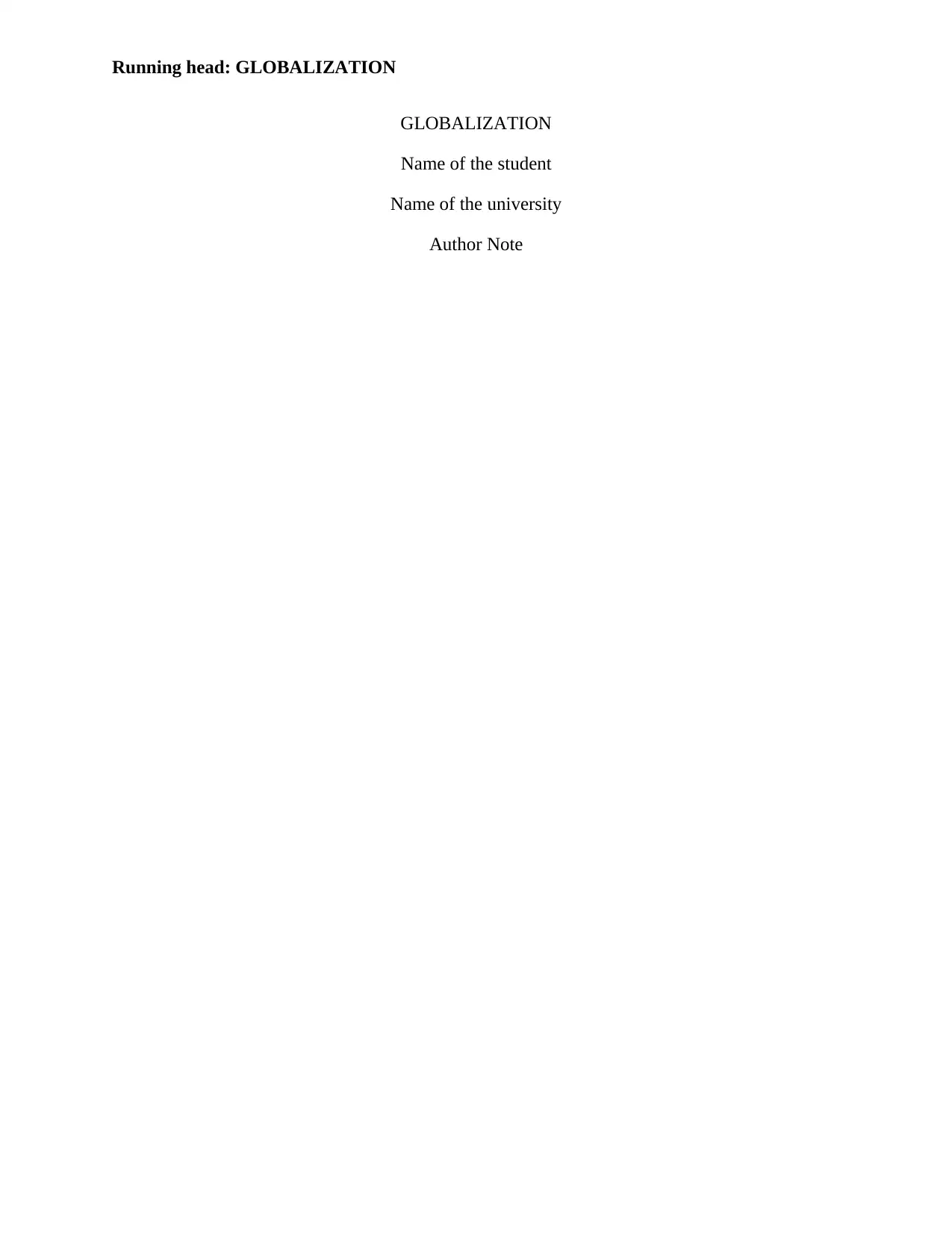
Running head: GLOBALIZATION
GLOBALIZATION
Name of the student
Name of the university
Author Note
GLOBALIZATION
Name of the student
Name of the university
Author Note
Paraphrase This Document
Need a fresh take? Get an instant paraphrase of this document with our AI Paraphraser
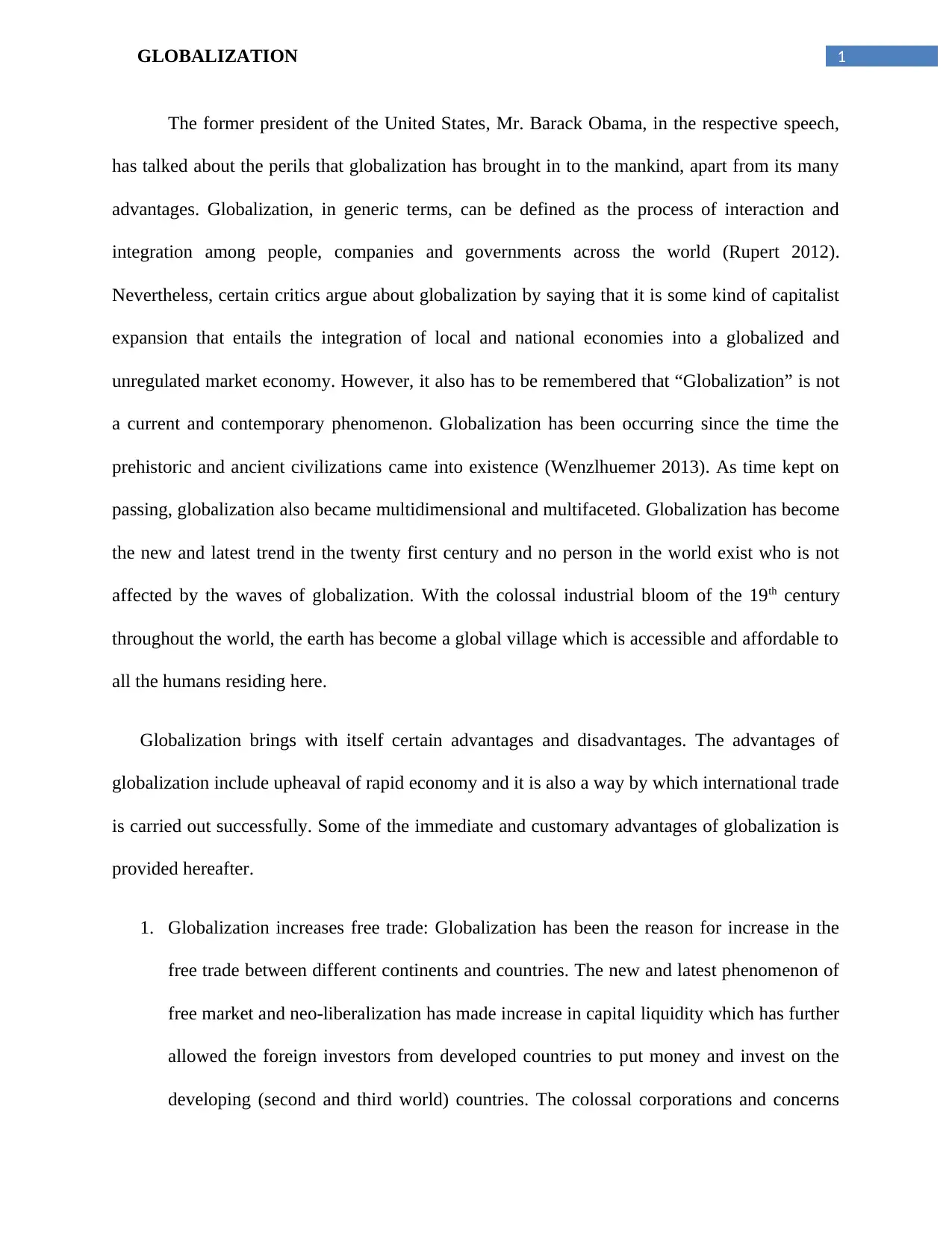
1GLOBALIZATION
The former president of the United States, Mr. Barack Obama, in the respective speech,
has talked about the perils that globalization has brought in to the mankind, apart from its many
advantages. Globalization, in generic terms, can be defined as the process of interaction and
integration among people, companies and governments across the world (Rupert 2012).
Nevertheless, certain critics argue about globalization by saying that it is some kind of capitalist
expansion that entails the integration of local and national economies into a globalized and
unregulated market economy. However, it also has to be remembered that “Globalization” is not
a current and contemporary phenomenon. Globalization has been occurring since the time the
prehistoric and ancient civilizations came into existence (Wenzlhuemer 2013). As time kept on
passing, globalization also became multidimensional and multifaceted. Globalization has become
the new and latest trend in the twenty first century and no person in the world exist who is not
affected by the waves of globalization. With the colossal industrial bloom of the 19th century
throughout the world, the earth has become a global village which is accessible and affordable to
all the humans residing here.
Globalization brings with itself certain advantages and disadvantages. The advantages of
globalization include upheaval of rapid economy and it is also a way by which international trade
is carried out successfully. Some of the immediate and customary advantages of globalization is
provided hereafter.
1. Globalization increases free trade: Globalization has been the reason for increase in the
free trade between different continents and countries. The new and latest phenomenon of
free market and neo-liberalization has made increase in capital liquidity which has further
allowed the foreign investors from developed countries to put money and invest on the
developing (second and third world) countries. The colossal corporations and concerns
The former president of the United States, Mr. Barack Obama, in the respective speech,
has talked about the perils that globalization has brought in to the mankind, apart from its many
advantages. Globalization, in generic terms, can be defined as the process of interaction and
integration among people, companies and governments across the world (Rupert 2012).
Nevertheless, certain critics argue about globalization by saying that it is some kind of capitalist
expansion that entails the integration of local and national economies into a globalized and
unregulated market economy. However, it also has to be remembered that “Globalization” is not
a current and contemporary phenomenon. Globalization has been occurring since the time the
prehistoric and ancient civilizations came into existence (Wenzlhuemer 2013). As time kept on
passing, globalization also became multidimensional and multifaceted. Globalization has become
the new and latest trend in the twenty first century and no person in the world exist who is not
affected by the waves of globalization. With the colossal industrial bloom of the 19th century
throughout the world, the earth has become a global village which is accessible and affordable to
all the humans residing here.
Globalization brings with itself certain advantages and disadvantages. The advantages of
globalization include upheaval of rapid economy and it is also a way by which international trade
is carried out successfully. Some of the immediate and customary advantages of globalization is
provided hereafter.
1. Globalization increases free trade: Globalization has been the reason for increase in the
free trade between different continents and countries. The new and latest phenomenon of
free market and neo-liberalization has made increase in capital liquidity which has further
allowed the foreign investors from developed countries to put money and invest on the
developing (second and third world) countries. The colossal corporations and concerns
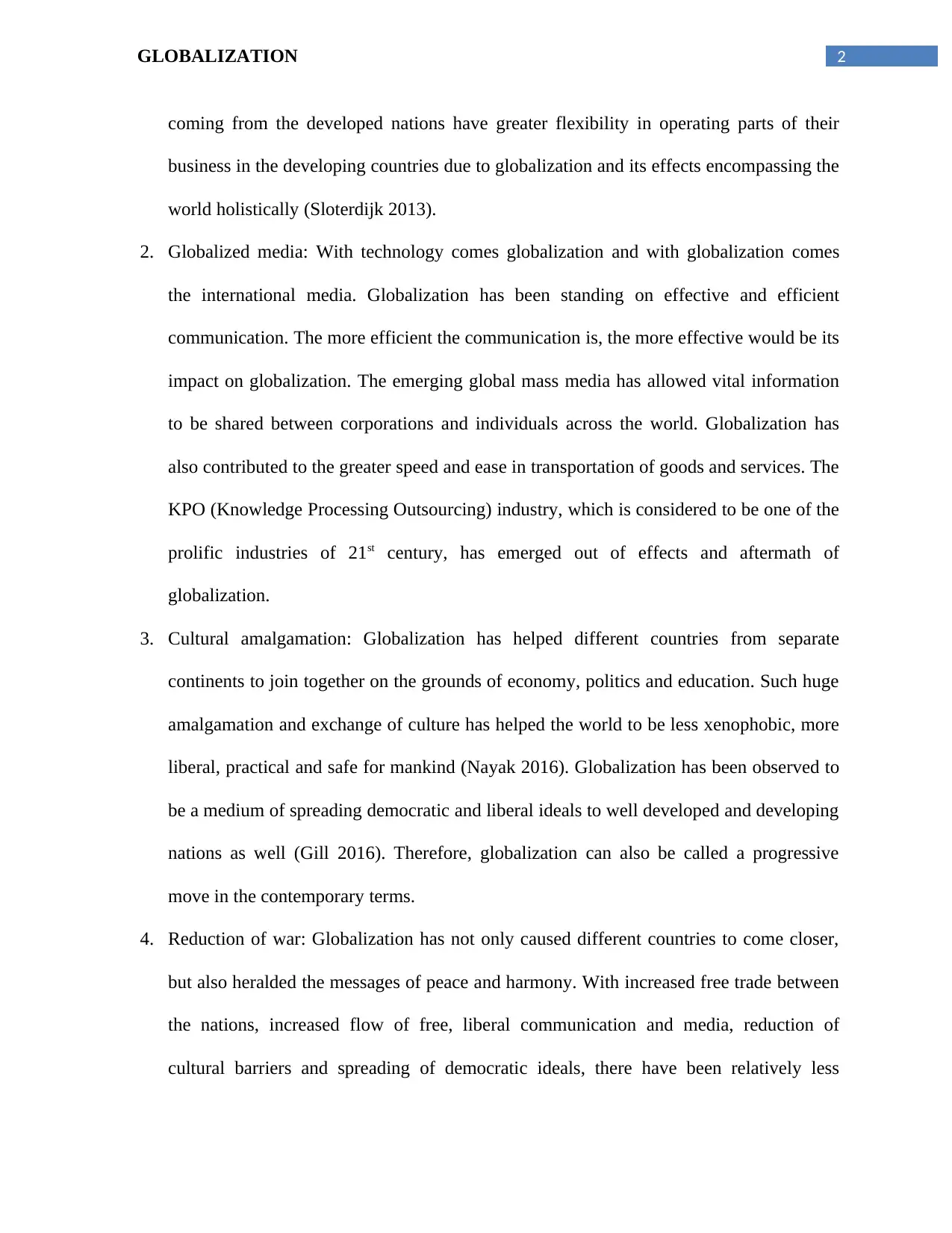
2GLOBALIZATION
coming from the developed nations have greater flexibility in operating parts of their
business in the developing countries due to globalization and its effects encompassing the
world holistically (Sloterdijk 2013).
2. Globalized media: With technology comes globalization and with globalization comes
the international media. Globalization has been standing on effective and efficient
communication. The more efficient the communication is, the more effective would be its
impact on globalization. The emerging global mass media has allowed vital information
to be shared between corporations and individuals across the world. Globalization has
also contributed to the greater speed and ease in transportation of goods and services. The
KPO (Knowledge Processing Outsourcing) industry, which is considered to be one of the
prolific industries of 21st century, has emerged out of effects and aftermath of
globalization.
3. Cultural amalgamation: Globalization has helped different countries from separate
continents to join together on the grounds of economy, politics and education. Such huge
amalgamation and exchange of culture has helped the world to be less xenophobic, more
liberal, practical and safe for mankind (Nayak 2016). Globalization has been observed to
be a medium of spreading democratic and liberal ideals to well developed and developing
nations as well (Gill 2016). Therefore, globalization can also be called a progressive
move in the contemporary terms.
4. Reduction of war: Globalization has not only caused different countries to come closer,
but also heralded the messages of peace and harmony. With increased free trade between
the nations, increased flow of free, liberal communication and media, reduction of
cultural barriers and spreading of democratic ideals, there have been relatively less
coming from the developed nations have greater flexibility in operating parts of their
business in the developing countries due to globalization and its effects encompassing the
world holistically (Sloterdijk 2013).
2. Globalized media: With technology comes globalization and with globalization comes
the international media. Globalization has been standing on effective and efficient
communication. The more efficient the communication is, the more effective would be its
impact on globalization. The emerging global mass media has allowed vital information
to be shared between corporations and individuals across the world. Globalization has
also contributed to the greater speed and ease in transportation of goods and services. The
KPO (Knowledge Processing Outsourcing) industry, which is considered to be one of the
prolific industries of 21st century, has emerged out of effects and aftermath of
globalization.
3. Cultural amalgamation: Globalization has helped different countries from separate
continents to join together on the grounds of economy, politics and education. Such huge
amalgamation and exchange of culture has helped the world to be less xenophobic, more
liberal, practical and safe for mankind (Nayak 2016). Globalization has been observed to
be a medium of spreading democratic and liberal ideals to well developed and developing
nations as well (Gill 2016). Therefore, globalization can also be called a progressive
move in the contemporary terms.
4. Reduction of war: Globalization has not only caused different countries to come closer,
but also heralded the messages of peace and harmony. With increased free trade between
the nations, increased flow of free, liberal communication and media, reduction of
cultural barriers and spreading of democratic ideals, there have been relatively less
⊘ This is a preview!⊘
Do you want full access?
Subscribe today to unlock all pages.

Trusted by 1+ million students worldwide
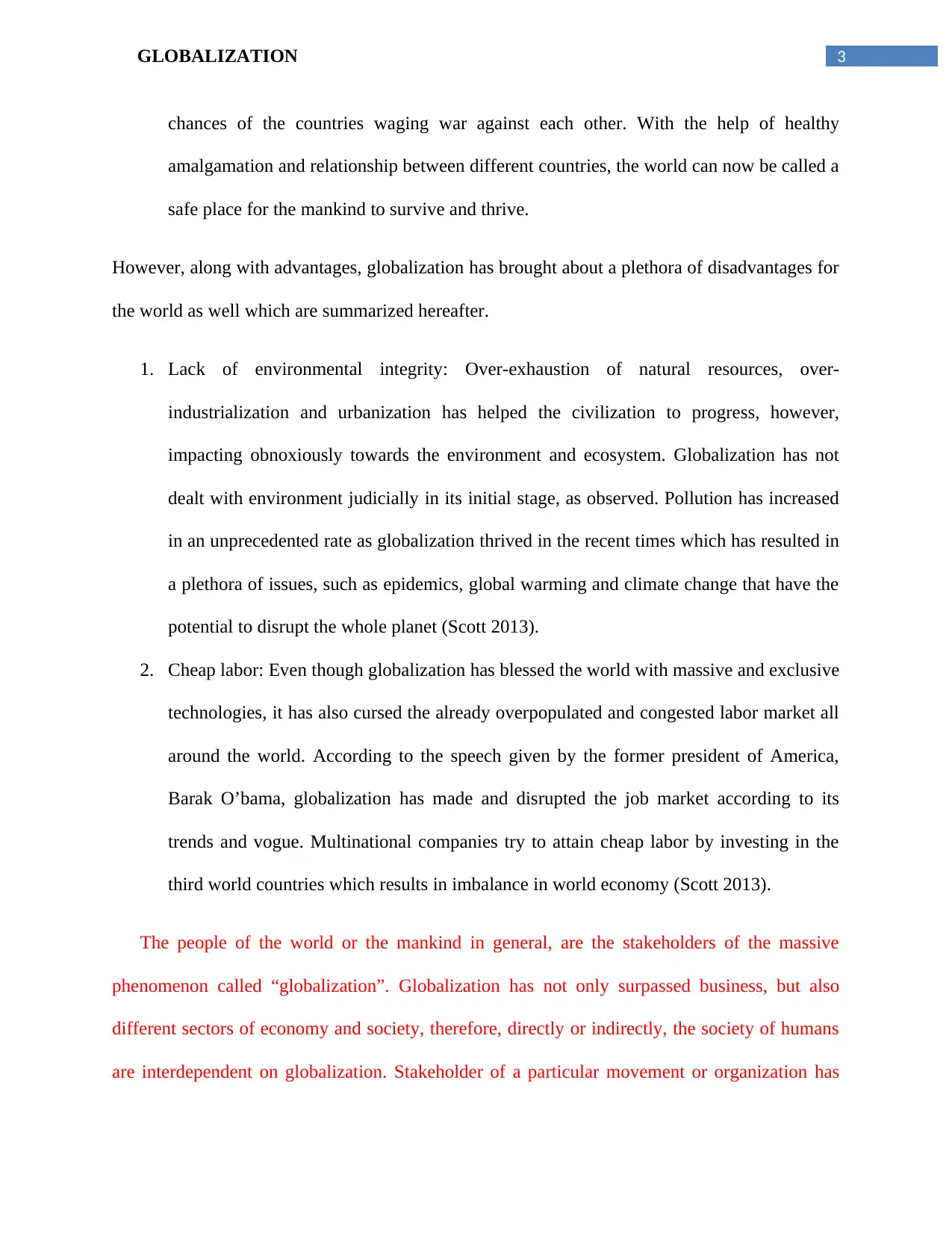
3GLOBALIZATION
chances of the countries waging war against each other. With the help of healthy
amalgamation and relationship between different countries, the world can now be called a
safe place for the mankind to survive and thrive.
However, along with advantages, globalization has brought about a plethora of disadvantages for
the world as well which are summarized hereafter.
1. Lack of environmental integrity: Over-exhaustion of natural resources, over-
industrialization and urbanization has helped the civilization to progress, however,
impacting obnoxiously towards the environment and ecosystem. Globalization has not
dealt with environment judicially in its initial stage, as observed. Pollution has increased
in an unprecedented rate as globalization thrived in the recent times which has resulted in
a plethora of issues, such as epidemics, global warming and climate change that have the
potential to disrupt the whole planet (Scott 2013).
2. Cheap labor: Even though globalization has blessed the world with massive and exclusive
technologies, it has also cursed the already overpopulated and congested labor market all
around the world. According to the speech given by the former president of America,
Barak O’bama, globalization has made and disrupted the job market according to its
trends and vogue. Multinational companies try to attain cheap labor by investing in the
third world countries which results in imbalance in world economy (Scott 2013).
The people of the world or the mankind in general, are the stakeholders of the massive
phenomenon called “globalization”. Globalization has not only surpassed business, but also
different sectors of economy and society, therefore, directly or indirectly, the society of humans
are interdependent on globalization. Stakeholder of a particular movement or organization has
chances of the countries waging war against each other. With the help of healthy
amalgamation and relationship between different countries, the world can now be called a
safe place for the mankind to survive and thrive.
However, along with advantages, globalization has brought about a plethora of disadvantages for
the world as well which are summarized hereafter.
1. Lack of environmental integrity: Over-exhaustion of natural resources, over-
industrialization and urbanization has helped the civilization to progress, however,
impacting obnoxiously towards the environment and ecosystem. Globalization has not
dealt with environment judicially in its initial stage, as observed. Pollution has increased
in an unprecedented rate as globalization thrived in the recent times which has resulted in
a plethora of issues, such as epidemics, global warming and climate change that have the
potential to disrupt the whole planet (Scott 2013).
2. Cheap labor: Even though globalization has blessed the world with massive and exclusive
technologies, it has also cursed the already overpopulated and congested labor market all
around the world. According to the speech given by the former president of America,
Barak O’bama, globalization has made and disrupted the job market according to its
trends and vogue. Multinational companies try to attain cheap labor by investing in the
third world countries which results in imbalance in world economy (Scott 2013).
The people of the world or the mankind in general, are the stakeholders of the massive
phenomenon called “globalization”. Globalization has not only surpassed business, but also
different sectors of economy and society, therefore, directly or indirectly, the society of humans
are interdependent on globalization. Stakeholder of a particular movement or organization has
Paraphrase This Document
Need a fresh take? Get an instant paraphrase of this document with our AI Paraphraser
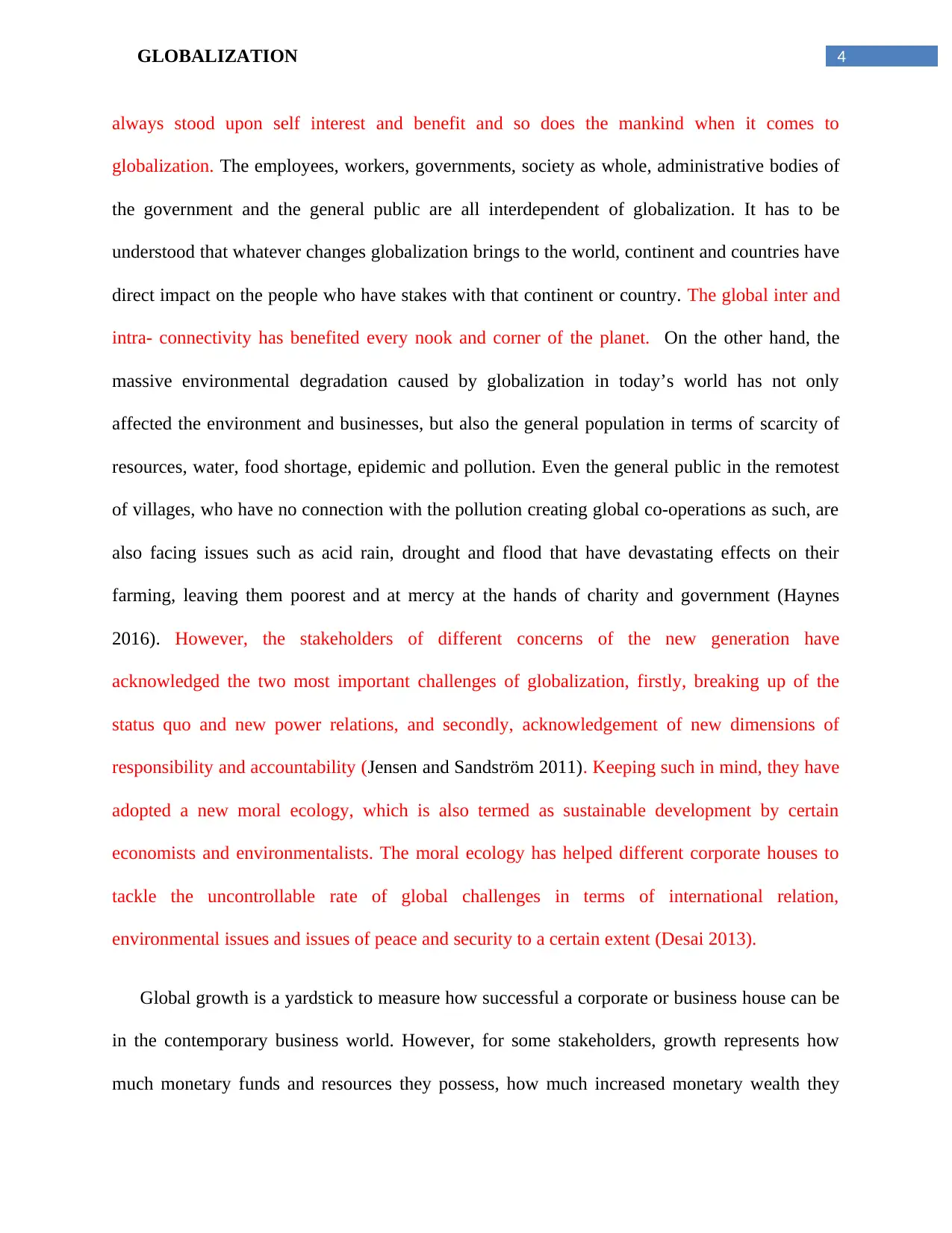
4GLOBALIZATION
always stood upon self interest and benefit and so does the mankind when it comes to
globalization. The employees, workers, governments, society as whole, administrative bodies of
the government and the general public are all interdependent of globalization. It has to be
understood that whatever changes globalization brings to the world, continent and countries have
direct impact on the people who have stakes with that continent or country. The global inter and
intra- connectivity has benefited every nook and corner of the planet. On the other hand, the
massive environmental degradation caused by globalization in today’s world has not only
affected the environment and businesses, but also the general population in terms of scarcity of
resources, water, food shortage, epidemic and pollution. Even the general public in the remotest
of villages, who have no connection with the pollution creating global co-operations as such, are
also facing issues such as acid rain, drought and flood that have devastating effects on their
farming, leaving them poorest and at mercy at the hands of charity and government (Haynes
2016). However, the stakeholders of different concerns of the new generation have
acknowledged the two most important challenges of globalization, firstly, breaking up of the
status quo and new power relations, and secondly, acknowledgement of new dimensions of
responsibility and accountability (Jensen and Sandström 2011). Keeping such in mind, they have
adopted a new moral ecology, which is also termed as sustainable development by certain
economists and environmentalists. The moral ecology has helped different corporate houses to
tackle the uncontrollable rate of global challenges in terms of international relation,
environmental issues and issues of peace and security to a certain extent (Desai 2013).
Global growth is a yardstick to measure how successful a corporate or business house can be
in the contemporary business world. However, for some stakeholders, growth represents how
much monetary funds and resources they possess, how much increased monetary wealth they
always stood upon self interest and benefit and so does the mankind when it comes to
globalization. The employees, workers, governments, society as whole, administrative bodies of
the government and the general public are all interdependent of globalization. It has to be
understood that whatever changes globalization brings to the world, continent and countries have
direct impact on the people who have stakes with that continent or country. The global inter and
intra- connectivity has benefited every nook and corner of the planet. On the other hand, the
massive environmental degradation caused by globalization in today’s world has not only
affected the environment and businesses, but also the general population in terms of scarcity of
resources, water, food shortage, epidemic and pollution. Even the general public in the remotest
of villages, who have no connection with the pollution creating global co-operations as such, are
also facing issues such as acid rain, drought and flood that have devastating effects on their
farming, leaving them poorest and at mercy at the hands of charity and government (Haynes
2016). However, the stakeholders of different concerns of the new generation have
acknowledged the two most important challenges of globalization, firstly, breaking up of the
status quo and new power relations, and secondly, acknowledgement of new dimensions of
responsibility and accountability (Jensen and Sandström 2011). Keeping such in mind, they have
adopted a new moral ecology, which is also termed as sustainable development by certain
economists and environmentalists. The moral ecology has helped different corporate houses to
tackle the uncontrollable rate of global challenges in terms of international relation,
environmental issues and issues of peace and security to a certain extent (Desai 2013).
Global growth is a yardstick to measure how successful a corporate or business house can be
in the contemporary business world. However, for some stakeholders, growth represents how
much monetary funds and resources they possess, how much increased monetary wealth they
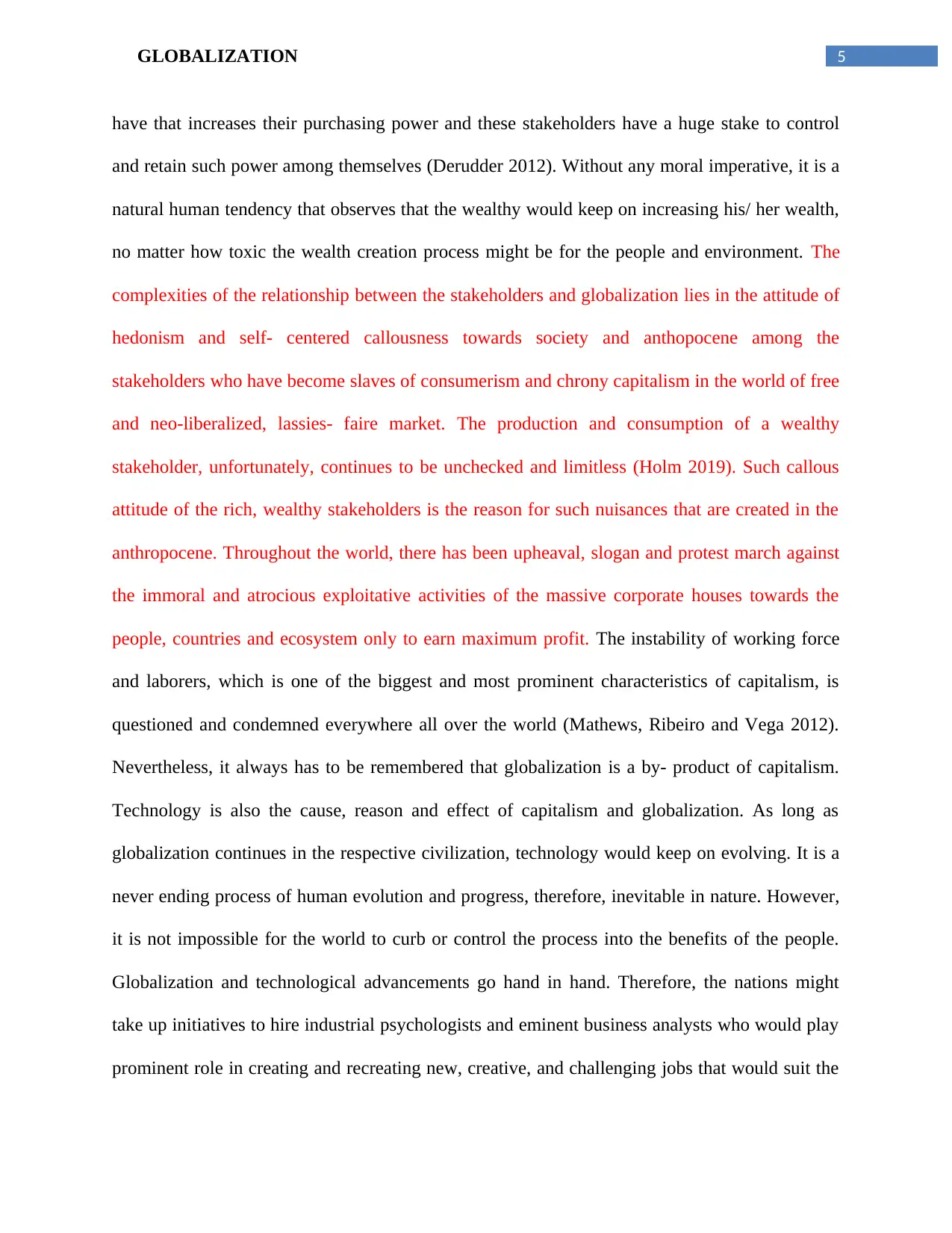
5GLOBALIZATION
have that increases their purchasing power and these stakeholders have a huge stake to control
and retain such power among themselves (Derudder 2012). Without any moral imperative, it is a
natural human tendency that observes that the wealthy would keep on increasing his/ her wealth,
no matter how toxic the wealth creation process might be for the people and environment. The
complexities of the relationship between the stakeholders and globalization lies in the attitude of
hedonism and self- centered callousness towards society and anthopocene among the
stakeholders who have become slaves of consumerism and chrony capitalism in the world of free
and neo-liberalized, lassies- faire market. The production and consumption of a wealthy
stakeholder, unfortunately, continues to be unchecked and limitless (Holm 2019). Such callous
attitude of the rich, wealthy stakeholders is the reason for such nuisances that are created in the
anthropocene. Throughout the world, there has been upheaval, slogan and protest march against
the immoral and atrocious exploitative activities of the massive corporate houses towards the
people, countries and ecosystem only to earn maximum profit. The instability of working force
and laborers, which is one of the biggest and most prominent characteristics of capitalism, is
questioned and condemned everywhere all over the world (Mathews, Ribeiro and Vega 2012).
Nevertheless, it always has to be remembered that globalization is a by- product of capitalism.
Technology is also the cause, reason and effect of capitalism and globalization. As long as
globalization continues in the respective civilization, technology would keep on evolving. It is a
never ending process of human evolution and progress, therefore, inevitable in nature. However,
it is not impossible for the world to curb or control the process into the benefits of the people.
Globalization and technological advancements go hand in hand. Therefore, the nations might
take up initiatives to hire industrial psychologists and eminent business analysts who would play
prominent role in creating and recreating new, creative, and challenging jobs that would suit the
have that increases their purchasing power and these stakeholders have a huge stake to control
and retain such power among themselves (Derudder 2012). Without any moral imperative, it is a
natural human tendency that observes that the wealthy would keep on increasing his/ her wealth,
no matter how toxic the wealth creation process might be for the people and environment. The
complexities of the relationship between the stakeholders and globalization lies in the attitude of
hedonism and self- centered callousness towards society and anthopocene among the
stakeholders who have become slaves of consumerism and chrony capitalism in the world of free
and neo-liberalized, lassies- faire market. The production and consumption of a wealthy
stakeholder, unfortunately, continues to be unchecked and limitless (Holm 2019). Such callous
attitude of the rich, wealthy stakeholders is the reason for such nuisances that are created in the
anthropocene. Throughout the world, there has been upheaval, slogan and protest march against
the immoral and atrocious exploitative activities of the massive corporate houses towards the
people, countries and ecosystem only to earn maximum profit. The instability of working force
and laborers, which is one of the biggest and most prominent characteristics of capitalism, is
questioned and condemned everywhere all over the world (Mathews, Ribeiro and Vega 2012).
Nevertheless, it always has to be remembered that globalization is a by- product of capitalism.
Technology is also the cause, reason and effect of capitalism and globalization. As long as
globalization continues in the respective civilization, technology would keep on evolving. It is a
never ending process of human evolution and progress, therefore, inevitable in nature. However,
it is not impossible for the world to curb or control the process into the benefits of the people.
Globalization and technological advancements go hand in hand. Therefore, the nations might
take up initiatives to hire industrial psychologists and eminent business analysts who would play
prominent role in creating and recreating new, creative, and challenging jobs that would suit the
⊘ This is a preview!⊘
Do you want full access?
Subscribe today to unlock all pages.

Trusted by 1+ million students worldwide
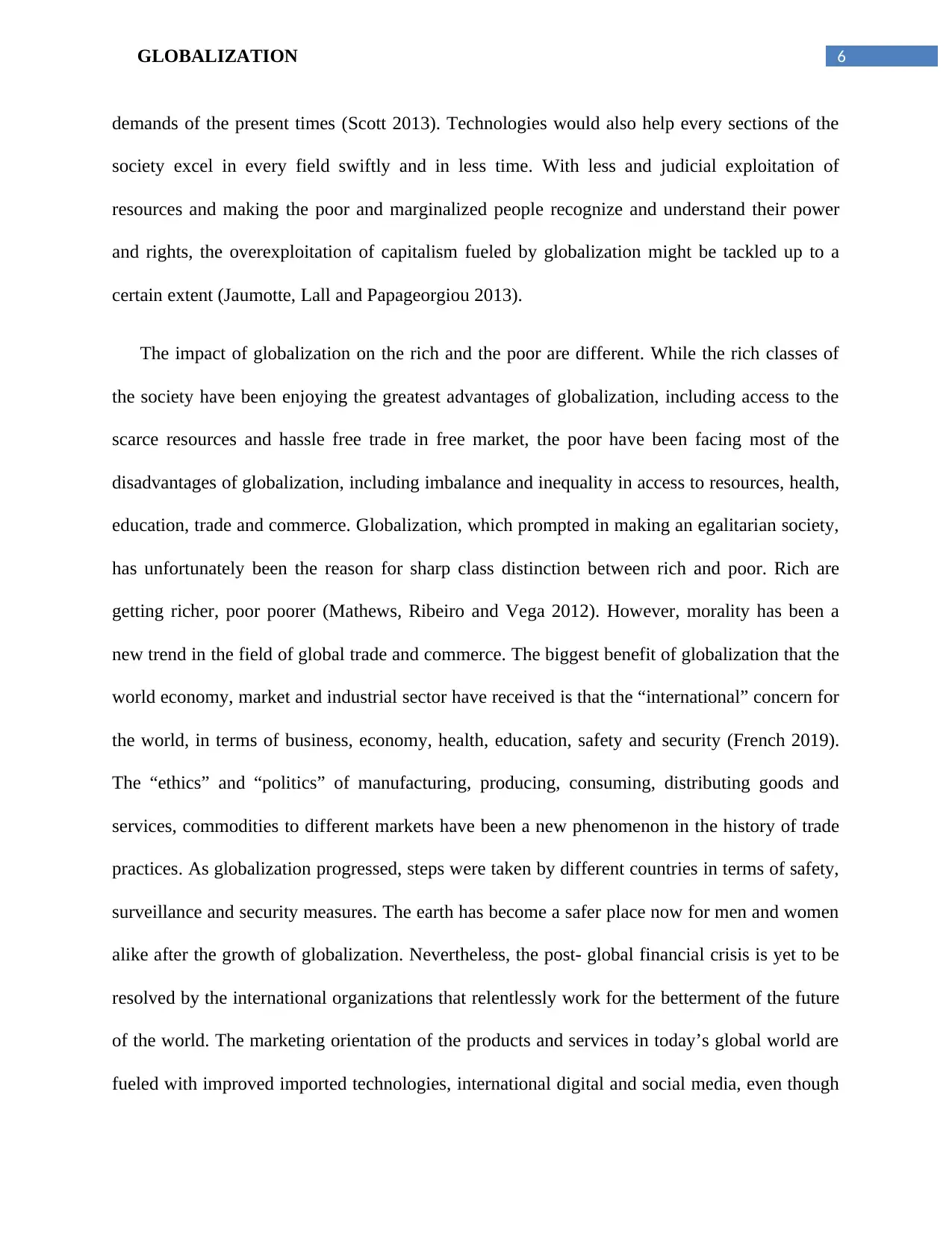
6GLOBALIZATION
demands of the present times (Scott 2013). Technologies would also help every sections of the
society excel in every field swiftly and in less time. With less and judicial exploitation of
resources and making the poor and marginalized people recognize and understand their power
and rights, the overexploitation of capitalism fueled by globalization might be tackled up to a
certain extent (Jaumotte, Lall and Papageorgiou 2013).
The impact of globalization on the rich and the poor are different. While the rich classes of
the society have been enjoying the greatest advantages of globalization, including access to the
scarce resources and hassle free trade in free market, the poor have been facing most of the
disadvantages of globalization, including imbalance and inequality in access to resources, health,
education, trade and commerce. Globalization, which prompted in making an egalitarian society,
has unfortunately been the reason for sharp class distinction between rich and poor. Rich are
getting richer, poor poorer (Mathews, Ribeiro and Vega 2012). However, morality has been a
new trend in the field of global trade and commerce. The biggest benefit of globalization that the
world economy, market and industrial sector have received is that the “international” concern for
the world, in terms of business, economy, health, education, safety and security (French 2019).
The “ethics” and “politics” of manufacturing, producing, consuming, distributing goods and
services, commodities to different markets have been a new phenomenon in the history of trade
practices. As globalization progressed, steps were taken by different countries in terms of safety,
surveillance and security measures. The earth has become a safer place now for men and women
alike after the growth of globalization. Nevertheless, the post- global financial crisis is yet to be
resolved by the international organizations that relentlessly work for the betterment of the future
of the world. The marketing orientation of the products and services in today’s global world are
fueled with improved imported technologies, international digital and social media, even though
demands of the present times (Scott 2013). Technologies would also help every sections of the
society excel in every field swiftly and in less time. With less and judicial exploitation of
resources and making the poor and marginalized people recognize and understand their power
and rights, the overexploitation of capitalism fueled by globalization might be tackled up to a
certain extent (Jaumotte, Lall and Papageorgiou 2013).
The impact of globalization on the rich and the poor are different. While the rich classes of
the society have been enjoying the greatest advantages of globalization, including access to the
scarce resources and hassle free trade in free market, the poor have been facing most of the
disadvantages of globalization, including imbalance and inequality in access to resources, health,
education, trade and commerce. Globalization, which prompted in making an egalitarian society,
has unfortunately been the reason for sharp class distinction between rich and poor. Rich are
getting richer, poor poorer (Mathews, Ribeiro and Vega 2012). However, morality has been a
new trend in the field of global trade and commerce. The biggest benefit of globalization that the
world economy, market and industrial sector have received is that the “international” concern for
the world, in terms of business, economy, health, education, safety and security (French 2019).
The “ethics” and “politics” of manufacturing, producing, consuming, distributing goods and
services, commodities to different markets have been a new phenomenon in the history of trade
practices. As globalization progressed, steps were taken by different countries in terms of safety,
surveillance and security measures. The earth has become a safer place now for men and women
alike after the growth of globalization. Nevertheless, the post- global financial crisis is yet to be
resolved by the international organizations that relentlessly work for the betterment of the future
of the world. The marketing orientation of the products and services in today’s global world are
fueled with improved imported technologies, international digital and social media, even though
Paraphrase This Document
Need a fresh take? Get an instant paraphrase of this document with our AI Paraphraser
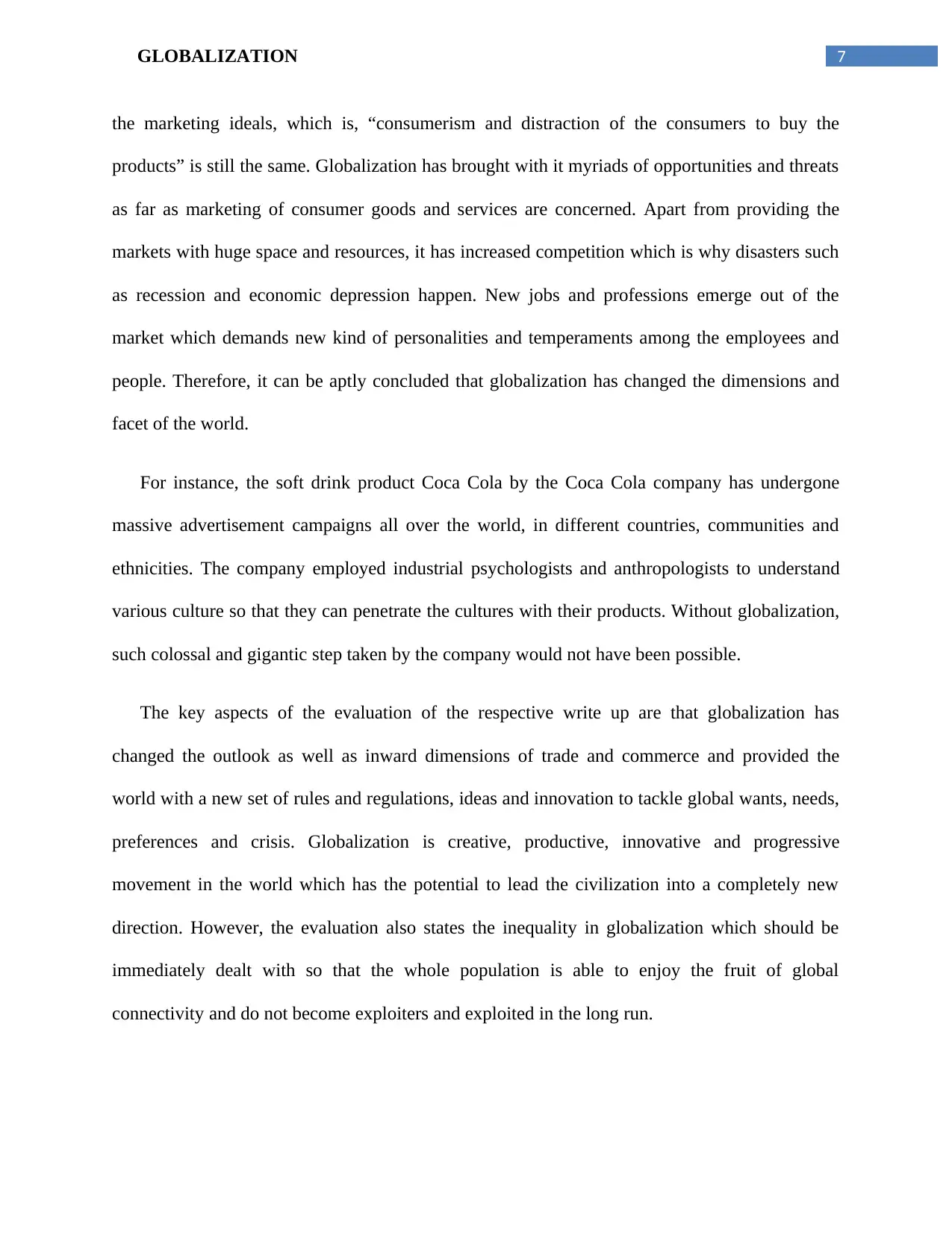
7GLOBALIZATION
the marketing ideals, which is, “consumerism and distraction of the consumers to buy the
products” is still the same. Globalization has brought with it myriads of opportunities and threats
as far as marketing of consumer goods and services are concerned. Apart from providing the
markets with huge space and resources, it has increased competition which is why disasters such
as recession and economic depression happen. New jobs and professions emerge out of the
market which demands new kind of personalities and temperaments among the employees and
people. Therefore, it can be aptly concluded that globalization has changed the dimensions and
facet of the world.
For instance, the soft drink product Coca Cola by the Coca Cola company has undergone
massive advertisement campaigns all over the world, in different countries, communities and
ethnicities. The company employed industrial psychologists and anthropologists to understand
various culture so that they can penetrate the cultures with their products. Without globalization,
such colossal and gigantic step taken by the company would not have been possible.
The key aspects of the evaluation of the respective write up are that globalization has
changed the outlook as well as inward dimensions of trade and commerce and provided the
world with a new set of rules and regulations, ideas and innovation to tackle global wants, needs,
preferences and crisis. Globalization is creative, productive, innovative and progressive
movement in the world which has the potential to lead the civilization into a completely new
direction. However, the evaluation also states the inequality in globalization which should be
immediately dealt with so that the whole population is able to enjoy the fruit of global
connectivity and do not become exploiters and exploited in the long run.
the marketing ideals, which is, “consumerism and distraction of the consumers to buy the
products” is still the same. Globalization has brought with it myriads of opportunities and threats
as far as marketing of consumer goods and services are concerned. Apart from providing the
markets with huge space and resources, it has increased competition which is why disasters such
as recession and economic depression happen. New jobs and professions emerge out of the
market which demands new kind of personalities and temperaments among the employees and
people. Therefore, it can be aptly concluded that globalization has changed the dimensions and
facet of the world.
For instance, the soft drink product Coca Cola by the Coca Cola company has undergone
massive advertisement campaigns all over the world, in different countries, communities and
ethnicities. The company employed industrial psychologists and anthropologists to understand
various culture so that they can penetrate the cultures with their products. Without globalization,
such colossal and gigantic step taken by the company would not have been possible.
The key aspects of the evaluation of the respective write up are that globalization has
changed the outlook as well as inward dimensions of trade and commerce and provided the
world with a new set of rules and regulations, ideas and innovation to tackle global wants, needs,
preferences and crisis. Globalization is creative, productive, innovative and progressive
movement in the world which has the potential to lead the civilization into a completely new
direction. However, the evaluation also states the inequality in globalization which should be
immediately dealt with so that the whole population is able to enjoy the fruit of global
connectivity and do not become exploiters and exploited in the long run.
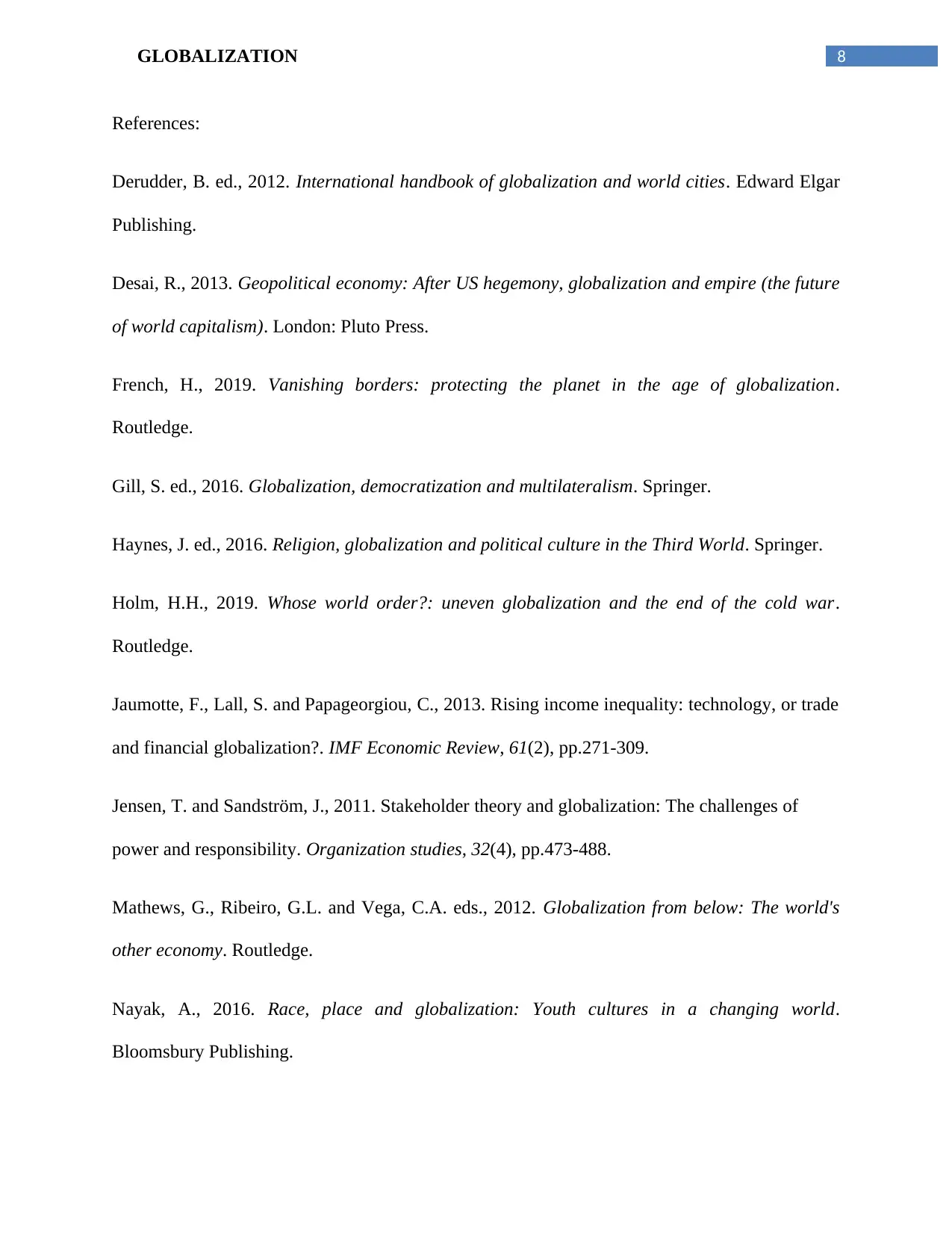
8GLOBALIZATION
References:
Derudder, B. ed., 2012. International handbook of globalization and world cities. Edward Elgar
Publishing.
Desai, R., 2013. Geopolitical economy: After US hegemony, globalization and empire (the future
of world capitalism). London: Pluto Press.
French, H., 2019. Vanishing borders: protecting the planet in the age of globalization.
Routledge.
Gill, S. ed., 2016. Globalization, democratization and multilateralism. Springer.
Haynes, J. ed., 2016. Religion, globalization and political culture in the Third World. Springer.
Holm, H.H., 2019. Whose world order?: uneven globalization and the end of the cold war.
Routledge.
Jaumotte, F., Lall, S. and Papageorgiou, C., 2013. Rising income inequality: technology, or trade
and financial globalization?. IMF Economic Review, 61(2), pp.271-309.
Jensen, T. and Sandström, J., 2011. Stakeholder theory and globalization: The challenges of
power and responsibility. Organization studies, 32(4), pp.473-488.
Mathews, G., Ribeiro, G.L. and Vega, C.A. eds., 2012. Globalization from below: The world's
other economy. Routledge.
Nayak, A., 2016. Race, place and globalization: Youth cultures in a changing world.
Bloomsbury Publishing.
References:
Derudder, B. ed., 2012. International handbook of globalization and world cities. Edward Elgar
Publishing.
Desai, R., 2013. Geopolitical economy: After US hegemony, globalization and empire (the future
of world capitalism). London: Pluto Press.
French, H., 2019. Vanishing borders: protecting the planet in the age of globalization.
Routledge.
Gill, S. ed., 2016. Globalization, democratization and multilateralism. Springer.
Haynes, J. ed., 2016. Religion, globalization and political culture in the Third World. Springer.
Holm, H.H., 2019. Whose world order?: uneven globalization and the end of the cold war.
Routledge.
Jaumotte, F., Lall, S. and Papageorgiou, C., 2013. Rising income inequality: technology, or trade
and financial globalization?. IMF Economic Review, 61(2), pp.271-309.
Jensen, T. and Sandström, J., 2011. Stakeholder theory and globalization: The challenges of
power and responsibility. Organization studies, 32(4), pp.473-488.
Mathews, G., Ribeiro, G.L. and Vega, C.A. eds., 2012. Globalization from below: The world's
other economy. Routledge.
Nayak, A., 2016. Race, place and globalization: Youth cultures in a changing world.
Bloomsbury Publishing.
⊘ This is a preview!⊘
Do you want full access?
Subscribe today to unlock all pages.

Trusted by 1+ million students worldwide
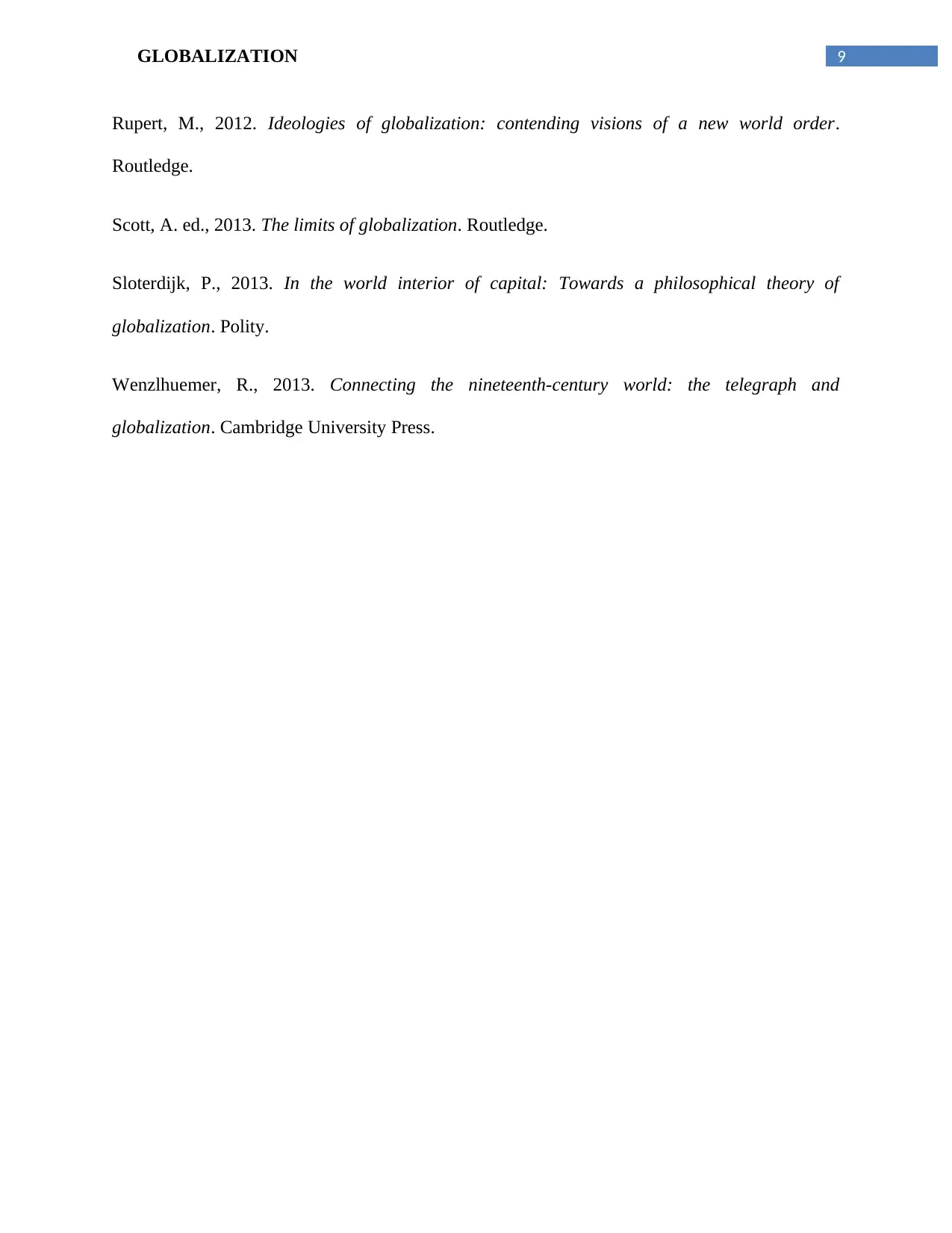
9GLOBALIZATION
Rupert, M., 2012. Ideologies of globalization: contending visions of a new world order.
Routledge.
Scott, A. ed., 2013. The limits of globalization. Routledge.
Sloterdijk, P., 2013. In the world interior of capital: Towards a philosophical theory of
globalization. Polity.
Wenzlhuemer, R., 2013. Connecting the nineteenth-century world: the telegraph and
globalization. Cambridge University Press.
Rupert, M., 2012. Ideologies of globalization: contending visions of a new world order.
Routledge.
Scott, A. ed., 2013. The limits of globalization. Routledge.
Sloterdijk, P., 2013. In the world interior of capital: Towards a philosophical theory of
globalization. Polity.
Wenzlhuemer, R., 2013. Connecting the nineteenth-century world: the telegraph and
globalization. Cambridge University Press.
1 out of 10
Related Documents
Your All-in-One AI-Powered Toolkit for Academic Success.
+13062052269
info@desklib.com
Available 24*7 on WhatsApp / Email
![[object Object]](/_next/static/media/star-bottom.7253800d.svg)
Unlock your academic potential
Copyright © 2020–2026 A2Z Services. All Rights Reserved. Developed and managed by ZUCOL.





